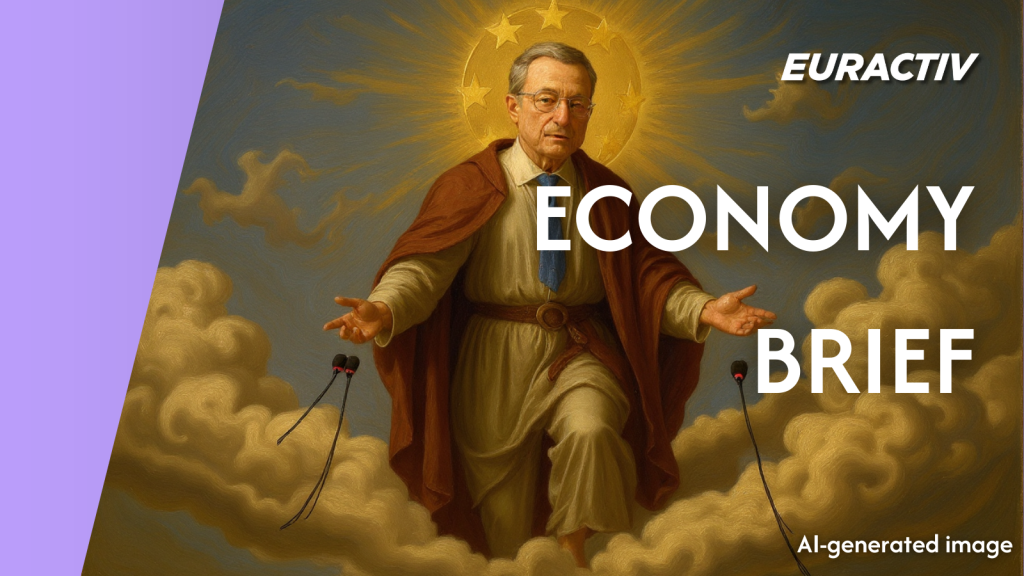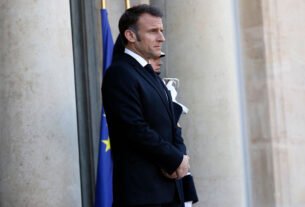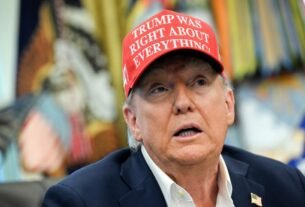Europe is a largely secular place. But if there is one person whom EU leaders deem a modern-day deity, it’s Mario Draghi.
The former European Central Bank president – widely credited as the “man who saved the euro” from the dustbin of history during last decade’s eurozone crisis – has conspicuously returned to the European political scene over the past week, prophesying that 2025 “will be remembered as the year in which [the] illusion” of Europe’s geopolitical heft “evaporated”.
Indeed, even the staunchest cynics should admit that the parallels between the Italian technocrat and the Messiah are deeply uncanny – perhaps divinely preordained.
After saving Europe from economic perdition, the 77-year-old disavowed the paradise of a stress-free EU pension to re-emerge as the bloc’s saviour last year with his “landmark” report on “European competitiveness” – which, like the Bible, many cite but very few have actually read.
Alas, we mortals failed to heed the Good Report’s commandments. Hence Draghi’s second resurrection this week – which, like Jesus’ own prophesied Second Coming, comes at a time of growing moral decadence and mounting fears of a (nuclear-induced) human apocalypse.
Many of the report’s proposals will be familiar to those blessed (or, perhaps, cursed) enough to live in the Brussels bubble. They include “integrating” the single market; “simplifying” regulations; and plugging the EU’s yawning “investment gap” to catch up with the US and China.
Less frequently noted, however, is the fact that Draghi’s report suffers from many of the failings that plague other sacred texts. These include critical omissions, deep interpretative ambiguities, and, in the worst cases, outright inconsistencies.
Take, for instance, the report’s claim that “there may be some industries where domestic producers have fallen so far behind” that imposing defensive trade measures, such as tariffs, “would only impose excessive deadweight costs on the [EU] economy”.
This claim naturally invites the question: Which industries, exactly, are so far behind that they are not worth protecting? Nowhere in the report’s 400 pages does Draghi deign to answer this obvious query.
Fortunately – and in a sign that direct communication with the divine is occasionally possible – this reporter was actually able to ask the Great Man himself this question during last year’s official presentation of the report (otherwise known as 1 AD, i.e. After Draghi).
“I had in mind the solar panel industry,” Draghi replied. “[But] I’m not suggesting, I just want to be clear on this, this report is advocating the choice and the defence of national champions. It’s neither advocating that a sort of granular selection process of which sectors should be taken care of or should be abandoned is there. No, nothing of the sort.”
Translation: Solar panels aside, Draghi’s “competitiveness” report isn’t, and never was, meant to tell us which specific industries Europe can, or should, attempt to be competitive in.
This omission is as problematic as it is bizarre. After all, there are numerous industries where, due to Chinese or American manufacturing prowess, it genuinely isn’t clear if EU protectionism is warranted. These sectors include wind turbines, electric vehicles, batteries, steel, semiconductors, and many others besides.
Couldn’t Draghi have offered at least some tentative recommendations in this area? And, if not, could he at least have explained why, given the “existential” nature of Europe’s economic predicament, he deems such suggestions unnecessary?
The Bible, recall, doesn’t merely provide general lessons about the nature of morality; it also offers “granular” lessons about how, exactly, the good life should be lived.
Competitive (in)consistency
Still, Draghi’s refusal to offer such “granular” details could, perhaps, be defensible if his other policy prescriptions were sufficiently insightful – or clear.
Alas, many are not. Take, for instance, Draghi’s meditations on EU competition policy, which are spread across two separate chapters that are – to put it mildly – not easily reconcilable.
In a chapter entitled “Revamping Competition”, Draghi repeatedly warns that market concentration can pose a “significant risk of entrenching a dominant position, ultimately harming effective competition” by generating “reduced incentives to innovate by both the companies seeking to concentrate and their rivals, clients and suppliers”.
However, in a chapter entitled “Digitalisation and advanced technologies”, Draghi blasts “remedies imposed upon attempts to consolidate the market into larger players” and claims that Brussels’ merger-resistant philosophy “disincentivises investments and risk-taking” in the bloc’s “fragmented” telecommunications industry.
So, which is it? Should Brussels encourage more telecoms mergers to boost private investment? Or would this reduce firms’ incentives to innovate, invest, and take risks?
The answer, as it happens, has stumped even the highest-ranking EU officials.
“If you look at the Draghi report, you will see the former central banker in it, because it’s really very balanced to the point that, I see people in perfect good faith reading it, and the two different pairs of eyes may come to really different conclusions,” Olivier Guersent, the former head of the Commission’s Directorate General for Competition, said last year.
Others are much less diplomatic. In fact, some even go as far as to accuse Draghi of outright contradiction.
In the telecommunications chapter “Draghi appears to complain about the very conduct – competition enforcement – that in the competition chapter he praises and wants to strengthen,” writes Fiona Scott Morton, a Yale professor and senior fellow at EU policy think-tank Bruegel.
Bizarrely, Scott Morton goes on to claim that, despite not being “entirely consistent” – in fact, blatantly contradictory – Draghi’s analysis of competition policy is “mainly good if not excellent”.
Even esteemed experts, it seems, fear being accused of blasphemy if they refuse to pay fealty to our economic Lord and Saviour.
Confounding conclusions
Draghi’s recent appearances, if anything, have only compounded the confusion surrounding what, exactly, he thinks EU policymakers need to do to boost the bloc’s stuttering economy.
One source of puzzlement relates to joint borrowing.
In his report, Draghi said the EU “should continue… to issue common debt instruments” to boost critical investments along the lines of the bloc’s €650 billion pandemic recovery fund – with the caveat that this should happen only if (unspecified) “political and institutional conditions are in place”.
Following fierce criticism from ‘frugal’ EU member states – in particular the Netherlands and Germany – Draghi quickly backed down, describing common debt as “not an essential ingredient” of the report.
In last week’s speech, however, Draghi expressed full-throated support for joint borrowing that went well beyond what was originally suggested in his report. “Only forms of common debt can support large European projects that fragmented national efforts could never achieve,” he said.
No explanation for the change of heart was provided or even hinted at. Nor is it immediately clear what the reason for the change of mind could possibly be: presumably, Europe’s “national efforts” to finance major investments were as “fragmented” in 2024 as they are in 2025.
The second – and perhaps even more crucial – point of confusion pertains to what Draghi believes the EU’s total investment needs are.
Last week, Draghi suggested that Europe’s “massive investments” are “estimated at about €1.2 trillion per year” – a claim corroborated by multiple other analyses, including by Draghi’s former colleagues at the ECB.
Unfortunately, this figure was not previously “estimated” by Draghi himself, whose report famously claimed the EU should boost annual investments by “at least” €750-800 billion.
Once again, Draghi provided no grounds whatsoever for the whopping 50% proposed funding increase, which is equivalent to more than 2% of the bloc’s total GDP.
In a sign that I may be losing my ability to communicate with the divine, Draghi did not respond to my questions about his change of heart when I tried to contact him through his publicly available email address. Further testing my faith, a separate contact address provided by the Commission also didn’t respond to a request for comment.
Three takeaways
These considerations suggest three main lessons.
The first is that Draghi’s reluctance to clearly explain his views to the public is – or should be – unacceptable in a democratic society. This is especially true given that his proposals are purported to represent the EU’s “North Star” for policymaking over the next half-decade.
The second is that we should reject the conceit that Draghi is an economic genius who is unswayed by party affiliation or political ideology.
Indeed, his most recent remarks have clearly demonstrated where Draghi’s political allegiances lie. In particular, Draghi – who (dare I say this?) is not only a former civil servant but is also an extremely wealthy former employee of Goldman Sachs – claimed last week that Europe “prospered” during the “neoliberal phase” between the 1980s and 2000s, when states were shrunk and markets reigned supreme.
The issue is not so much that this claim is factually incorrect. (In fact, Europe’s growth rate significantly slowed and inequality soared during this period.) It is that Draghi appears completely oblivious to the fact that the word “neoliberal” is almost universally wielded as a pejorative – and, arguably, demonstrates just how much of a “neoliberal” he actually is.
The third, and perhaps most important lesson is that, like any purported prophet, we should refrain from taking Draghi’s word as Gospel – especially given how unclear his “word” frequently is.
Contradiction, of course, isn’t necessarily sinful: the Bible itself is replete with inconsistencies. Some even argue that “God” itself is an inherently contradictory concept.
Still, it does make you wonder whether, all things considered, atheism might be a more prudent path to follow.
Economy News Roundup
Brussels formally proposes slashing tariffs on US industrial and agricultural products. The move is a critical step toward ensuring Washington follows through on its pledge to lower levies on EU car exports, as outlined in the recently agreed EU-US trade deal. A senior Commission official suggested Brussels would suspend its legislative proposal, which must still be approved by member states and the European Parliament, if Washington doesn’t fulfil its side of the bargain. Some leading MEPs have already suggested that Parliament could refuse to ratify the Commission’s proposal, citing the asymmetrical nature of the deal and the fact that the White House has threatened further levies on EU exports over the past week. Read more.
French assets plunge amid fears of government collapse. Prime Minister François Bayrou’s surprise decision to call a confidence vote on Monday triggered a sharp decline in French stocks and bonds. The vote, which Bayrou is expected to lose, comes after the centrist premier failed to persuade the country’s divided National Assembly to back his next year’s deficit-slashing budget. “Political instability is eroding French bonds’ traditional core status,” said Nour Al Ali, macro strategist at Bloomberg News. “With austerity plans dividing parliament, France’s borrowing costs risk climbing further, leaving both bonds and equities struggling to regain momentum.” Read more.
German firms’ confidence defies economic reality. Germany’s Business Climate Index, a closely watched poll compiled by the Ifo Institute, a Munich-based think tank, rose to 89.0 this month, up from 88.6 in July. The increase, which beat analysts’ forecast of 88.7, comes amid growing fears that German businesses are more optimistic about their country’s prospects than is warranted by the economic data, with sweeping US tariffs and increasingly fierce competition from China posing a severe threat to Germany’s export-led manufacturers, especially its flagship auto sector. “It is unclear where this optimism is coming from,” Carsten Brzeski, head of macro at ING research, wrote, adding that it is “hard to see how” Germany will escape from “seemingly never-ending stagnation” before the end of the year. Read more.





